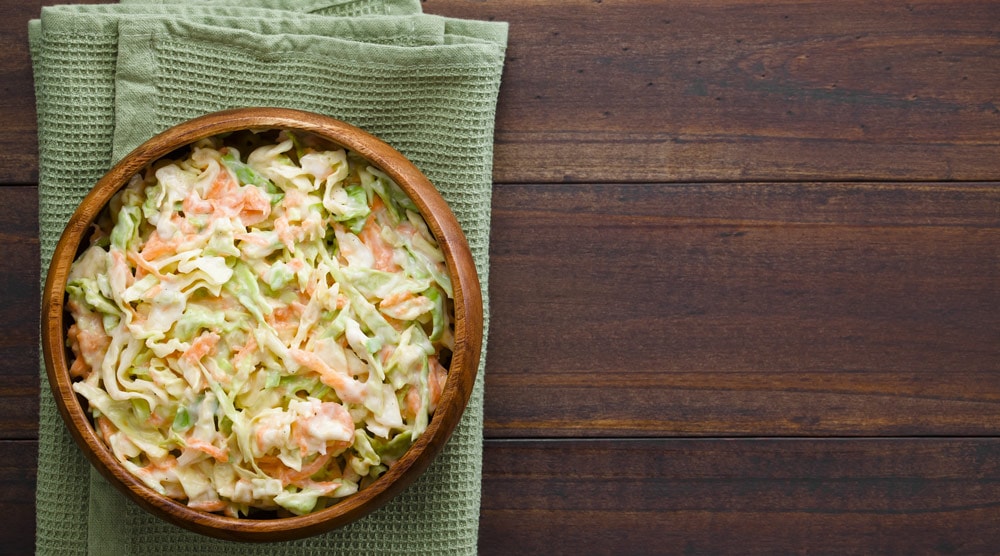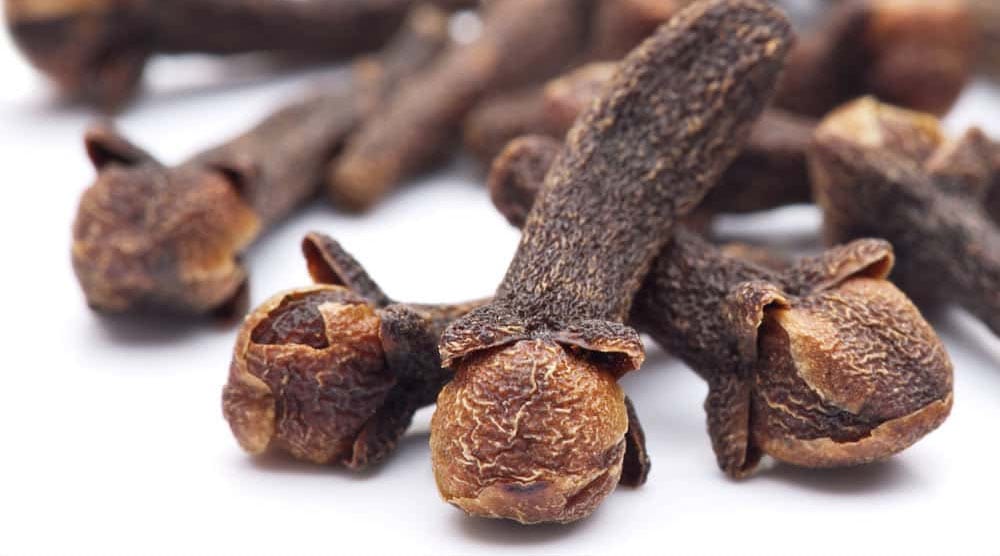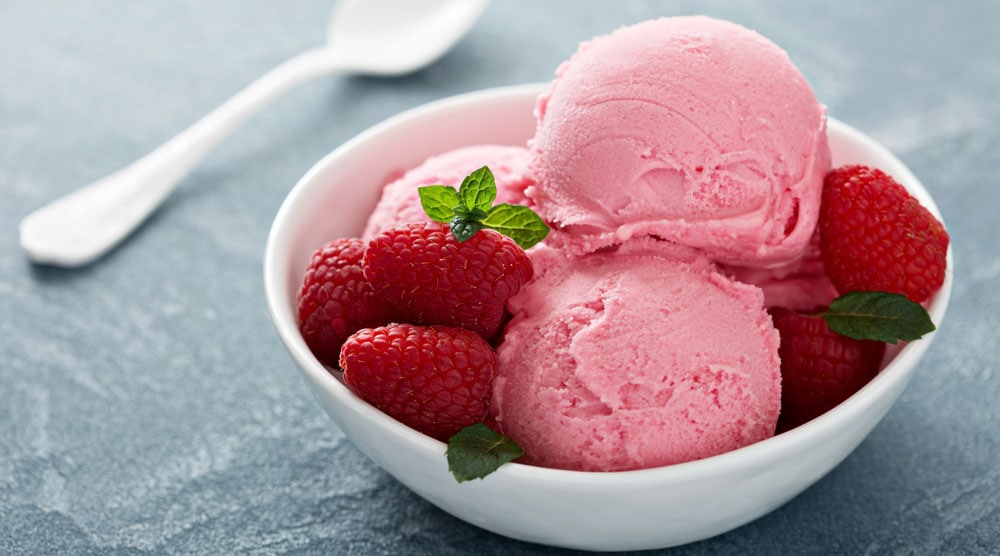Can dogs eat coleslaw? The simple answer is “no” – coleslaw is a food you should avoid giving your dog.
Coleslaw often contains unhealthy ingredients for dogs, such as salt, sugar, vinegar, and high-fat mayonnaise. Many recipes also contain onions or garlic powder, which are toxic to our canine companions.
Additionally, cabbage can present a choking hazard when chopped into small pieces. Raw cabbage can also cause a stomach upset.
In this article, we’ll discuss which coleslaw ingredients are dangerous to dogs and what to do if your dog eats it.
Contents
Which Coleslaw Ingredients Are Dangerous To Dogs?

There isn’t a single recipe for coleslaw, so the ingredients can vary.
However, there are several common coleslaw ingredients that are unhealthy or even toxic to your dog. For this reason, you should contact a vet if you suspect your dog has eaten coleslaw.
Here’s an overview of the most problematic ingredients in many coleslaw recipes.
Onions
Onions are highly toxic to dogs. As many coleslaw recipes contain onions, dogs should never eat this human food.
The reason onions are so dangerous to dogs is that they cause red blood cells to break down, leading to anemia. All parts of the onion are toxic to dogs, including onion powder.
Common symptoms of onion toxicity include lethargy, panting, pale gums, fainting, and a loss of appetite. The dog may also vomit and suffer from elevated heart rate.
Contact your vet immediately if your dog has eaten onion – particularly if you notice any of the symptoms above. Onion toxicity can be fatal and becomes harder to treat as the onion gets further into the dog’s digestive system, so don’t take any risks.
Note: Dogs with chronic conditions such as kidney or liver disease, hypothyroidism, or cancer are at a higher risk for onion toxicity.
Cabbage
Cabbage can be safe in small quantities, but there are some potential dangers when a dog eats this food.
For example, small pieces of cabbage, like those used in coleslaw, can present a choking hazard (depending on the dog’s size).
Raw cabbage also contains thiocyanate, which can cause hypothyroidism. While your dog would need to consume a lot of raw cabbage for it to harm your dog’s thyroid, it’s best to avoid letting them eat it.
Cabbage can also cause gastro upset, including excessive gas or loose stool, depending on how your dog’s stomach reacts to it.
Mayonnaise
Due to its high-fat content, mayonnaise is not something your dog should eat. High-fat foods can cause short-term issues for dogs, like an upset stomach. It can also cause chronic conditions like pancreatitis or obesity.
Additionally, mayonnaise is usually made from eggs, soybean oil, and vinegar. While not toxic, some dogs may have an allergic reaction to eggs or soy.
So, if your dog eats coleslaw, watch for symptoms of an allergic reaction. This can include excessive scratching, rashes, dry or flaky skin, vomiting or diarrhea, or facial inflammation.
Some commercial mayonnaises may also contain added salt, sugar, or other spices, such as paprika, that may cause irritation for your dog. Always check the ingredients if your dog has consumed store-bought mayonnaise.
Salt
Many coleslaw recipes contain added table salt. Dogs are susceptible to sodium poisoning, so it’s best to avoid giving them foods that contain added salt.
Symptoms of salt poisoning include:
- Vomiting
- Excessive lethargy
- Diarrhea
- Shortness of breath
- Tremors or seizures
- Shortness of breath
Symptoms of salt poisoning usually appear within three hours of ingestion. Contact your vet if your dog shows any of the symptoms above, as sodium poisoning requires veterinary treatment.
Note: Sodium is a required mineral for dogs, but only in the right amounts. Your pet should receive all their necessary sodium from dog food rather than human foods.
Sweeteners
Many coleslaw recipes contain sweeteners. These include honey, maple syrup, and granulated sugar.
Too much sugar in your dog’s diet can lead to weight gain, diabetes, cavities, and other health concerns. Granulated sugar is also not part of a dog’s natural diet and should be avoided.
Vinegar
Many coleslaw recipes include small amounts of vinegar. However, some recipes replace mayonnaise completely with a vinegar base, so there is quite a bit more vinegar in some recipes than others.
While a small amount of diluted vinegar isn’t harmful, larger quantities can cause loose stool or gastro upset. The acidity of vinegar can be especially dangerous to dogs with kidney disease, since their bodies don’t process the acid well.
What Should I Do If My Dog Ate Coleslaw?
The potential danger to your dog will depend on how much coleslaw was consumed, the size of your dog, and the included ingredients.
A small amount of coleslaw will likely not be dangerous unless it contains a lot of onion. Even so, you should still monitor your dog for symptoms of poisoning and contact your vet immediately if you notice any.
If your dog has eaten large amounts of coleslaw, then it’s a good idea to seek veterinary advice. The biggest risk is onions, since they’re toxic to dogs and can cause anemia.
Symptoms of anemia can include:
- Excessive lethargy or becoming tired quickly
- Lack of appetite
- Blood loss (blood in stool, nose, vomit, urine)
- Pale gums
- Rapid or labored breathing
- Fainting
It’s vital to seek immediate treatment from your vet if you notice any of the symptoms above. Fast intervention could make a big difference to the chance of successful treatment.
Frequently Asked Questions
Can Dogs Eat Plain, Cooked Cabbage?
Plain, cooked cabbage is fine for dogs to eat in moderation. Cooked cabbage is easier to digest and contains much less thiocyanate, which reduces the risk of thyroid issues.
However, some dogs are more sensitive than others to eating cabbage, so you should only give it in small quantities. As cabbage contains lots of fibre, it may cause loose stool or gas.
Can Dogs Eat KFC Coleslaw?
No. KFC coleslaw is especially unhealthy for dogs, since it contains large amounts of sugar, fat, and sodium. While the exact recipe is proprietary, some copycat recipes include as much as 1 cup of sugar for just 2 pounds of cabbage.
The KFC coleslaw ingredients also list xanthan gum, which can cause diarrhea in dogs. In addition to onion, the ingredients list also contains “natural flavor,” which could include toxic spices.
Summary
While you may enjoy coleslaw as a side dish, it’s not something to share with your dog.
Many of the ingredients are unhealthy and have little nutritional value for your pup. Onions, in particularly, are very dangerous to dogs.
Looking for a vegetable that’s suitable for your dog to eat? Check out our article on “Can Dogs Eat Bell Peppers?”



